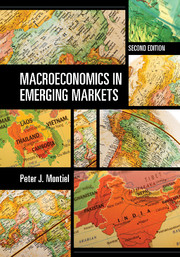Book contents
- Frontmatter
- Contents
- Preface
- PART 1 THE MACROECONOMIC FRAMEWORK
- PART 2 A BENCHMARK MACROECONOMIC MODEL
- 4 The Aggregate Production Function, the Labor Market, and Aggregate Supply
- 5 Aggregate Demand and Goods-Market Equilibrium
- 6 Financial Markets
- 7 Short-Run Macroeconomic Equilibrium
- 8 Medium-Run Macroeconomic Equilibrium
- PART 3 PUBLIC FINANCE AND MACROECONOMIC PERFORMANCE
- PART 4 MONETARY INSTITUTIONS AND MONETARY POLICY
- PART 5 EXCHANGE RATE MANAGEMENT
- PART 6 THE FINANCIAL SECTOR AND MACROECONOMIC PERFORMANCE
- PART 7 VARIETIES OF EMERGING-MARKET CRISES
- Index
- References
5 - Aggregate Demand and Goods-Market Equilibrium
Published online by Cambridge University Press: 05 June 2012
- Frontmatter
- Contents
- Preface
- PART 1 THE MACROECONOMIC FRAMEWORK
- PART 2 A BENCHMARK MACROECONOMIC MODEL
- 4 The Aggregate Production Function, the Labor Market, and Aggregate Supply
- 5 Aggregate Demand and Goods-Market Equilibrium
- 6 Financial Markets
- 7 Short-Run Macroeconomic Equilibrium
- 8 Medium-Run Macroeconomic Equilibrium
- PART 3 PUBLIC FINANCE AND MACROECONOMIC PERFORMANCE
- PART 4 MONETARY INSTITUTIONS AND MONETARY POLICY
- PART 5 EXCHANGE RATE MANAGEMENT
- PART 6 THE FINANCIAL SECTOR AND MACROECONOMIC PERFORMANCE
- PART 7 VARIETIES OF EMERGING-MARKET CRISES
- Index
- References
Summary
Now that we have seen what determines the supply of goods produced in the domestic economy, we can turn to the other side of the market: the total demand for those goods. In this chapter, we will derive the aggregate demand for domestic goods under the simplifying assumption that the domestic interest rate is determined as an exogenous policy variable by the central bank. We will then put our description of aggregate demand together with that of aggregate supply from the preceding chapter to complete our first model of short-run macroeconomic equilibrium. We will use this model to explore how the domestic economy responds to a variety of shocks, both to the supply and the demand side of the economy, and we will trace the effects of such shocks not just on the market for domestic goods but also on the labor market and the economy's balance of payments accounts.
We begin by examining in Section I the factors that influence the aggregate demand for domestic goods by domestic as well as foreign residents. In Section II, we will put aggregate supply and demand together to show how the equilibrium values of the domestic price level and level of output are determined, as well as those of a variety of other macroeconomic variables that are of interest to policy makers in emerging and developing countries. Section III examines how all these endogenous variables respond to a wide range of both nonpolicy and policy shocks.
- Type
- Chapter
- Information
- Macroeconomics in Emerging Markets , pp. 98 - 117Publisher: Cambridge University PressPrint publication year: 2011



